- Serbia
Get to know Serbia
- Citizens
Culture and science
Health services
Pension and disability insurance
- Business
Employment
Economy
- Media
- Government
- Contact
Keep in touch
Contact form
Back
Keepin touch
Whether you have a question, comment, suggestion or any problem in the purview of the government, send us your message and we will try to respond as soon as possible. If your problem is not in our purview, we will forward your message to the relevant institution.
Q:
A:
Budget revision precondition for Serbia’s stability
Belgrade,
24 April 2009
Minister of Finance Diana Dragutinovic today said that the government must adopt a budget revision as soon as possible, as it is essential to Serbia’s economic stability.
Talking about amendments to the 2009 budget law, Dragutinovic pointed out that the government’s economic and fiscal policies during the global financial crisis should help decrease public spending, stabilise the economy and prevent a surge in inflation.
According to the Minister the budget revision stipulates that budget income will go down to RSD 649.3 billion, which is RSD 28.9 billion less than was first planned.
Minister Dragutinovic noted that Serbia's economic growth has slowed down, adding that falls have been recorded in industrial production and manufacturing, as well as in export and import.
According to the IMF’s latest estimates Serbia’s economic activity will drop by 2%, imports falling by 21.8% and exports by 15%, said Dragutinovic.
The Minister pointed to the importance of the arrangement with the IMF, worth €3 billion, that should provide financial stability for Serbia and strengthen the country’s foreign currency reserves.
If not for this fiscal adjustment, the deficit would be 6% of GDP instead of 3%, she said.
The budget deficit was increased from RSD 49.9 billion to nearly RSD 70 billion, she said, noting that the government’s economic measures should reduce expenses by RSD 65.4 billion and increase revenues by RSD 30.4 billion.
Dragutinovic noted that the savings in the public administration will amount to RSD 40 billion by reducing both the number of employees and salaries.
The budget revenues will increase by RSD 4 billion from increased excises on fuel prices while RSD 3 billion will be generated from a temporary tax on mobile phone use, she said.
The pension fund will be increased by RSD 22.9 billion while the National Employment Service will receive RSD 5 billion more than planned, she said, noting that subsidies, mainly for agriculture, will be cut by RSD 6.9 billion.
According to the Minister the budget revision stipulates that budget income will go down to RSD 649.3 billion, which is RSD 28.9 billion less than was first planned.
Minister Dragutinovic noted that Serbia's economic growth has slowed down, adding that falls have been recorded in industrial production and manufacturing, as well as in export and import.
According to the IMF’s latest estimates Serbia’s economic activity will drop by 2%, imports falling by 21.8% and exports by 15%, said Dragutinovic.
The Minister pointed to the importance of the arrangement with the IMF, worth €3 billion, that should provide financial stability for Serbia and strengthen the country’s foreign currency reserves.
If not for this fiscal adjustment, the deficit would be 6% of GDP instead of 3%, she said.
The budget deficit was increased from RSD 49.9 billion to nearly RSD 70 billion, she said, noting that the government’s economic measures should reduce expenses by RSD 65.4 billion and increase revenues by RSD 30.4 billion.
Dragutinovic noted that the savings in the public administration will amount to RSD 40 billion by reducing both the number of employees and salaries.
The budget revenues will increase by RSD 4 billion from increased excises on fuel prices while RSD 3 billion will be generated from a temporary tax on mobile phone use, she said.
The pension fund will be increased by RSD 22.9 billion while the National Employment Service will receive RSD 5 billion more than planned, she said, noting that subsidies, mainly for agriculture, will be cut by RSD 6.9 billion.
-
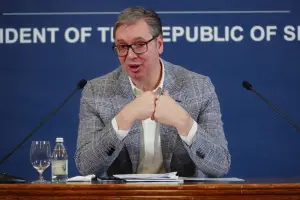 Belgrade, 4 January 2026
Belgrade, 4 January 2026Violation of UN Charter has become dominant principle of contemporary politics
-
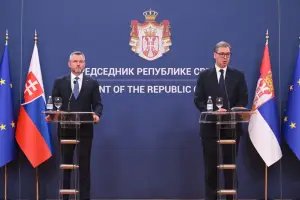 Belgrade, 21 December 2025
Belgrade, 21 December 2025Strengthening cooperation with Slovakia in many areas
-
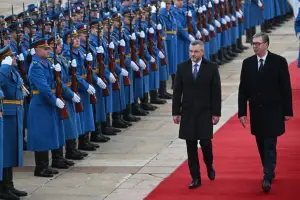 Belgrade, 21 December 2025
Belgrade, 21 December 2025President of Slovakia ceremonially welcomed in front of Palace of Serbia
-
 Belgrade, 18 December 2025
Belgrade, 18 December 2025Vučić welcomes President of Georgia in front of Palace of Serbia
-
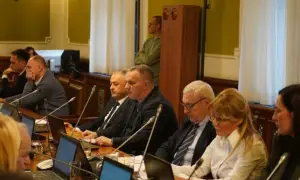 Belgrade, 15 December 2025
Belgrade, 15 December 2025Serbia needs strong, stable education system
-
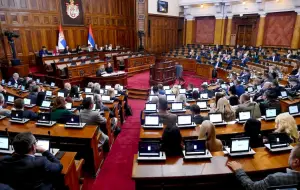 Belgrade, 3 December 2025
Belgrade, 3 December 2025Parliament adopts 2026 budget
-
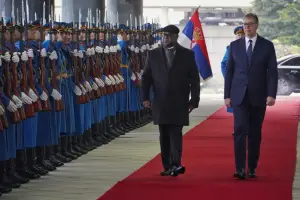 Belgrade, 28 November 2025
Belgrade, 28 November 2025Serbian President welcomes President of DR Congo
-
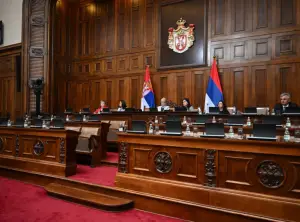 Belgrade, 7 November 2025
Belgrade, 7 November 2025Parliament adopts multiple laws
-
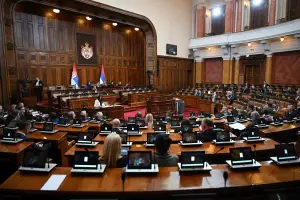 Belgrade, 22 October 2025
Belgrade, 22 October 2025Parliament adopts several laws, ratifies multiple international agreements
-
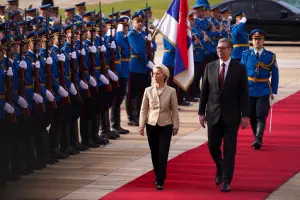 Belgrade, 15 October 2025
Belgrade, 15 October 2025Vučić welcomes Ursula von der Leyen in front of Palace of Serbia
